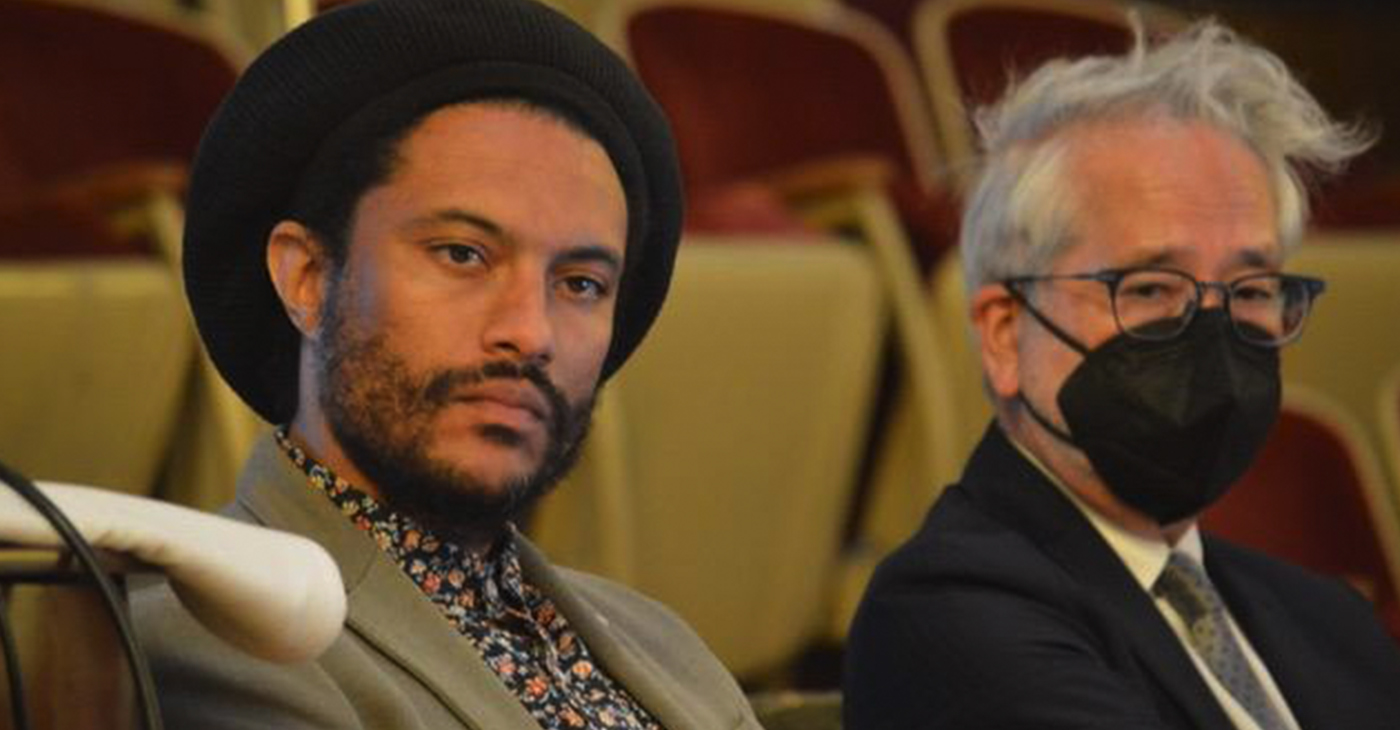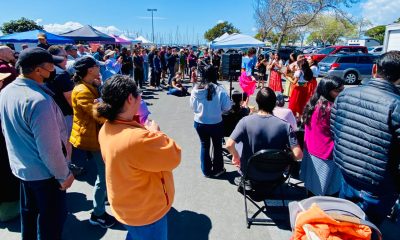Activism
Anchoring Organizations for Reparations Task Force Hold Public ‘Listening Sessions’
“This is one of two, free official-sponsored listening sessions that the task force has asked us to do,” said Chris Lodgson, an Elk Grove resident and CJEC member. “This will definitely help us get an accurate account (of the harms) done to Black people in this state.” CJEC is a state-wide coalition of organizations, associations, and community members united for reparations for the descendants of enslaved Black American men and women.

By Antonio Ray Harvey, California Black Media
The Coalition for a Just and Equitable California (CJEC), a reparations advocacy group, is inviting residents of Northern California to attend a “Listening Session” to discuss reparations.
The meeting will be held in Oakland on Saturday, May 28 from 1 p.m. to 4 p.m.
With the support of the California Task Force to Study and Develop Reparations Proposals for African Americans and the state’s Department of Justice (DOJ), the event, open to the public, will be held at the California Ballroom, located at 1736 Franklin St.
“This is one of two, free official-sponsored listening sessions that the task force has asked us to do,” said Chris Lodgson, an Elk Grove resident and CJEC member. “This will definitely help us get an accurate account (of the harms) done to Black people in this state.”
CJEC is a state-wide coalition of organizations, associations, and community members united for reparations for the descendants of enslaved Black American men and women.
The Oakland meeting is one of a series of listening sessions that will be hosted by Reparations Task Force anchor organizations across the state. Seven “anchor organizations” have been selected to partner and host the gatherings in conjunction with the task force.
The listening sessions are designed to ensure certain communities in the state provide their thoughts and concerns about the work the task force is doing.
Each organization will help the task force evaluate California’s role in slavery and Jim Crow discrimination — and follow that work up with developing resolutions to compensate African Americans for past and ongoing race-based injustices.
Task force members expected to attend the Oakland session are Dr. Jovan Scott Lewis, chair of the Department of Geography at the University of California Berkeley and vice-chair Dr. Amos Brown, a civil rights leader and pastor of Third Baptist Church in San Francisco whose journey to leadership started under the tutelage of Dr. Martin Luther King Jr. in the 1960s.
Lewis has just published the book, “Violent Utopia: Dispossession and Black Restoration in Tulsa.” Lewis, a Jamaican-born scholar, retells details of the 1921 Tulsa race massacre and paints a picture of its aftermath. His book traces the history of Black Oklahomans from the post-Reconstruction migration of formerly enslaved people to that state’s Indian Territory to contemporary efforts to rebuild Black prosperity.
The monograph focuses on how the massacre in Tulsa’s Greenwood neighborhood, colloquially known as “Black Wall Street,” diminished the spirit of freedom and derailed progress African Americans had begun to make.
Scott told Los Angeles-based Politics in Black, a podcast hosted by reparations advocates Chad Brown and Friday Jones, that his purpose is to listen to the residents of Oakland and supply them with background information about the Task Force.
The Task Force will submit its first report to the California Legislature in June. The 13-chapter document will detail the committee’s findings thus far and include recommendations related to them.
“It’s important to know that these are preliminary recommendations. The actual work of coming up with reparations recommendations is what we’re going to be doing for all the issues (for the final report in 2023),” Scott told Brown and Jones. “I am really looking forward to having the conversations that we will have over the next several months around compensation. Reparations are compensation, and from day one, my position has been cash-based reparations.”
Gov. Gavin Newsom signed Assembly Bill (AB) 3121 into law in 2020. California Secretary of State Shirley Weber authored the legislation establishing the task force when she was a member of the State Legislature. The committee is charged with studying slavery and its lingering effects on African Americans with a “special consideration” for descendants of persons enslaved in the United States, the bill language instructs.
AB 3121 also requires members to recommend what compensation should be, who should receive it, and how it should be paid. A panel of economists contracted by the task force will provide their perspective on the financial aspects of compensation and its impacts.
Lodgson also urges members of the community to “share their experiences” with anchor organizations such as the Black Equity Collective, Afrikan Black Coalition, Black Power Network, Congregations Organized for Prophetic Engagement (COPE), and Othering and Belonging Institute.
Marcus Champion, a board member for the National Assembly of American Slavery Descendants Los Angeles (NAASDLA) and CJEC will also speak at the listening session in Oakland.
Kellie Farrish, a professional Bay Area genealogist and member of the Association of Professional Genealogists, will join Champion at the session. She has 20 years of experience working with African American families descended from slavery, piecing together their broken family histories.
“These listening sessions are important and probably the center, the core part, of the task force’s community engagement process,” Lodgson said. “This is one of the more important ways that the community can learn about reparations in California. This is the way to get the word out to the people from seven organizations.”
The Listening Session at the California Ballroom is free. For more information, visit TWITTER: @cjecofficial or inquire at CJECOfficial@gmail.com
Activism
Oakland Post: Week of April 24 – 30, 2024
The printed Weekly Edition of the Oakland Post: Week of April 24 – 30, 2024

To enlarge your view of this issue, use the slider, magnifying glass icon or full page icon in the lower right corner of the browser window. ![]()
Activism
Oakland Post: Week of April 17 – 23, 2024
The printed Weekly Edition of the Oakland Post: Week of April 17 – 23, 2024

To enlarge your view of this issue, use the slider, magnifying glass icon or full page icon in the lower right corner of the browser window. ![]()
Activism
Oakland Schools Honor Fred Korematsu Day of Civil Liberties
Every Jan. 30, OUSD commemorates the legacy of Fred Korematsu, an Oakland native, a Castlemont High School graduate, and a national symbol of resistance, resilience, and justice. His defiant stand against racial injustice and his unwavering commitment to civil rights continue to inspire the local community and the nation. Tuesday was “Fred Korematsu Day of Civil Liberties and the Constitution” in the state of California and a growing number of states across the country.

By Post Staff
Every Jan. 30, OUSD commemorates the legacy of Fred Korematsu, an Oakland native, a Castlemont High School graduate, and a national symbol of resistance, resilience, and justice.
His defiant stand against racial injustice and his unwavering commitment to civil rights continue to inspire the local community and the nation. Tuesday was “Fred Korematsu Day of Civil Liberties and the Constitution” in the state of California and a growing number of states across the country.
One OUSD school is named in his honor: Fred T. Korematsu Discovery Academy (KDA) elementary in East Oakland.
Several years ago, founding KDA Principal Charles Wilson, in a video interview with anti-hate organization “Not In Our Town,” said, “We chose the name Fred Korematsu because we really felt like the attributes that he showed in his work are things that the children need to learn … that common people can stand up and make differences in a large number of people’s lives.”
Fred Korematsu was born in Oakland on Jan. 30, 1919. His parents ran a floral nursery business, and his upbringing in Oakland shaped his worldview. His belief in the importance of standing up for your rights and the rights of others, regardless of race or background, was the foundation for his activism against racial prejudice and for the rights of Japanese Americans during World War II.
At the start of the war, Korematsu was turned away from enlisting in the National Guard and the Coast Guard because of his race. He trained as a welder, working at the docks in Oakland, but was fired after the bombing of Pearl Harbor in 1941. Fear and prejudice led to federal Executive Order 9066, which forced more than 120,000 Japanese Americans out of their homes and neighborhoods and into remote internment camps.
The 23-year-old Korematsu resisted the order. He underwent cosmetic surgery and assumed a false identity, choosing freedom over unjust imprisonment. His later arrest and conviction sparked a legal battle that would challenge the foundation of civil liberties in America.
Korematsu’s fight culminated in the Supreme Court’s initial ruling against him in 1944. He spent years in a Utah internment camp with his family, followed by time living in Salt Lake City where he was dogged by racism.
In 1976, President Gerald Ford overturned Executive Order 9066. Seven years later, the 9th Circuit Court of Appeals in San Francisco vacated Korematsu’s conviction. He said in court, “I would like to see the government admit that they were wrong and do something about it so this will never happen again to any American citizen of any race, creed, or color.”
Korematsu’s dedication and determination established him as a national icon of civil rights and social justice. He advocated for justice with Rosa Parks. In 1998, President Bill Clinton gave him the Presidential Medal of Freedom saying, “In the long history of our country’s constant search for justice, some names of ordinary citizens stand for millions of souls … To that distinguished list, today we add the name of Fred Korematsu.”
After Sept. 11, 2001, Korematsu spoke out against hatred and discrimination, saying what happened to Japanese Americans should not happen to people of Middle Eastern descent.
Korematsu’s roots in Oakland and his education in OUSD are a source of great pride for the city, according to the school district. His most famous quote, which is on the Korematsu elementary school mural, is as relevant now as ever, “If you have the feeling that something is wrong, don’t be afraid to speak up.”
-

 Community2 weeks ago
Community2 weeks agoFinancial Assistance Bill for Descendants of Enslaved Persons to Help Them Purchase, Own, or Maintain a Home
-

 Activism3 weeks ago
Activism3 weeks agoOakland Post: Week of April 3 – 6, 2024
-

 Business2 weeks ago
Business2 weeks agoV.P. Kamala Harris: Americans With Criminal Records Will Soon Be Eligible for SBA Loans
-

 Community2 weeks ago
Community2 weeks agoAG Bonta Says Oakland School Leaders Should Comply with State Laws to Avoid ‘Disparate Harm’ When Closing or Merging Schools
-

 Activism2 weeks ago
Activism2 weeks agoOakland Post: Week of April 10 – 16, 2024
-

 Community1 week ago
Community1 week agoOakland WNBA Player to be Inducted Into Hall of Fame
-

 Community1 week ago
Community1 week agoRichmond Nonprofit Helps Ex-Felons Get Back on Their Feet
-

 City Government2 weeks ago
City Government2 weeks agoLAO Releases Report on Racial and Ethnic Disparities in California Child Welfare System


















































